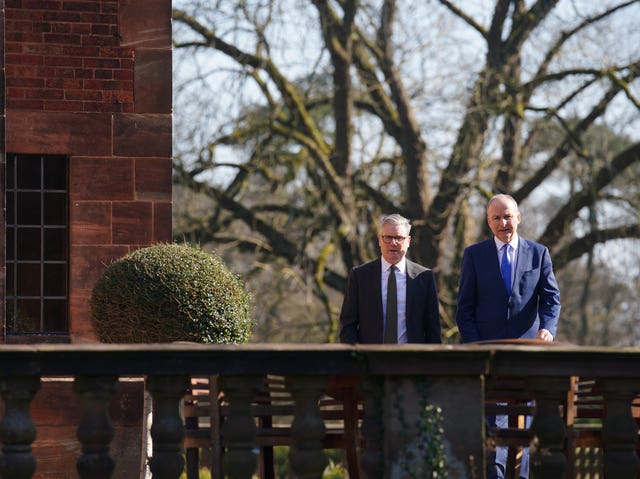Ireland and UK unveil joint framework on Troubles legacy

By Jonathan McCambridge and David Young, PA
The Irish and UK overnments’ long-awaited framework to deal with the legacy of the Northern Ireland Troubles is founded on “reciprocal cooperation”, the Tánaiste will say later.
Tánaiste Simon Harris will join Northern Ireland Secretary Hilary Benn on Friday afternoon to formally unveil the proposals, which have been developed following substantive engagement between the two governments.
Mr Harris is expected to describe the framework as a “night and day improvement” on the previous mechanisms introduced unilaterally by the previous UK government.
Vitally, at the heart of this framework, is a commitment by the two governments to reciprocal cooperation. We can only comprehensively address the legacy of the Troubles if we do so across both jurisdictions. Reciprocity is what will make this framework work and deliver for families
The new framework, which includes commitments to fundamentally reform the mechanisms established in the 2023 Legacy Act, will raise expectations that the Irish Government is moving closer to dropping its interstate legal case against the UK.
Labour came to power with a pledge to replace and repeal the 2023 Legacy Act introduced by the Conservatives, which halted scores of civil cases and inquests into Troubles deaths.
The Act was opposed by victims’ groups and political parties in Northern Ireland, and it led the Government to launch an interstate legal case against the UK claiming it breached the European Convention on Human Rights (ECHR).
The legislation created a new legacy body, the Independent Commission for Reconciliation and Information Recovery (ICRIR), to take over the investigation of all outstanding Troubles cases.
The Act also contained an offer of conditional immunity to some suspects but this was disapplied after legal action by bereaved families.
The new framework is closer to the details of the Stormont House Agreement of 2014, which were never implemented.
It will see the ICRIR fundamentally reformed to become a Legacy Commission, which will investigate Troubles deaths.
A separate body will be created to deal with information recovery.

There are no proposals for amnesties for suspects within the new framework.
The PA news agency understands the framework will include the following measures:
– Removal of the bar on legacy-related civil cases in UK courts and allow the resumption of inquests that were halted by the Legacy Act. Inquests that had not been started before the Legacy Act’s legal guillotine came into force will be reviewed to establish the best way forward.
– Significant restructuring of the ICRIR. It will be renamed the Legacy Commission. There will be two co-equal directors of investigations. A statutory independent oversight board will be created along with an advisory group made up of victims and survivors. An independent panel will also advise on senior appointments to the commission. Measures will be introduced to identify any conflict of interest issues within the commission.
– The commission will be empowered to carry out investigations capable of leading to prosecutions.
– Independent judges will hold inquisitorial public hearings, with victims’ families able to participate.
-A separate truth recovery mechanism will be created called the Independent Commission on Information Retrieval. This will be a jointly funded UK/Irish cross-border body that will initially operate on a pilot basis.
– Reform of disclosure processes to address concerns over a controversial veto power held by the Northern Ireland Secretary of State on what sensitive information can be accessed by legacy bodies.
– The Irish Government will commit to “fullest possible cooperate” with the new Legacy Commission.
– A new dedicated Legacy Unit will be created within An Garda Síochána.
– The Government will also ring-fence €25 million to support victims and survivors in participating and engaging with legacy bodies.
The two governments believe the new framework includes proposals which are ECHR compliant and are capable of securing the support of victims and bereaved families.
Mr Harris is expected to say later: “Vitally, at the heart of this framework, is a commitment by the two governments to reciprocal cooperation. We can only comprehensively address the legacy of the Troubles if we do so across both jurisdictions. Reciprocity is what will make this framework work and deliver for families.”
He will credit the joint agreement as creating a moment of “imperfect opportunity”.
“It would be easy to hold out for the perfect, to inevitably fail, and then to stand criticising on the sidelines; a comfortable hurler on the ditch,” he is expected to say.
“That would be a fundamental mistake; one that could not later be rectified.”
Mr Harris will urge victims and survivors to consider supporting the proposals.
“I hope that victims and families see in this deal a set of substantive commitments, that leave behind the flawed Legacy Act, and that are genuinely designed to provide answers for victims, survivors and families,” he will say.
We will ensure that protections are in place to allow us to get to the truth and to ensure that no-one can rewrite history or make veterans suffer any more
“I hope that you will give the reformed Legacy Commission an opportunity to deliver for you.
“And I hope that you will hold our feet to the fire. I hope you will hold us accountable for delivering every paragraph of this framework.
“I have heard over and over again that no one wants their children, and grandchildren, to live with trauma and pain for another generation.
“As a father, I understand this viscerally.
“Today’s package gives us a chance to end this cycle. I believe, in my heart of hearts, that this is our best, and last, opportunity. We have to grasp it. It would be very wrong not to do so.”
The framework will require new legislation at both Westminster and at the Dail.
Both governments have carried out consultation with victims’ groups and families and will continue to do so once the framework is published.
It is understood the UK government also intends to publish separate measures aimed at offering protections to witnesses participating in Troubles’ related probes.
There will be specific measures designed for veterans, such as the ability for them to participate or give evidence remotely from Great Britain, without having to travel back to Northern Ireland.
Armed forces minister Al Carns recently told the House of Commons that the UK government would ensure that repealing the Legacy Act would not result in veterans being punished.
He said: “We will ensure that protections are in place to allow us to get to the truth and to ensure that no-one can rewrite history or make veterans suffer any more.”





